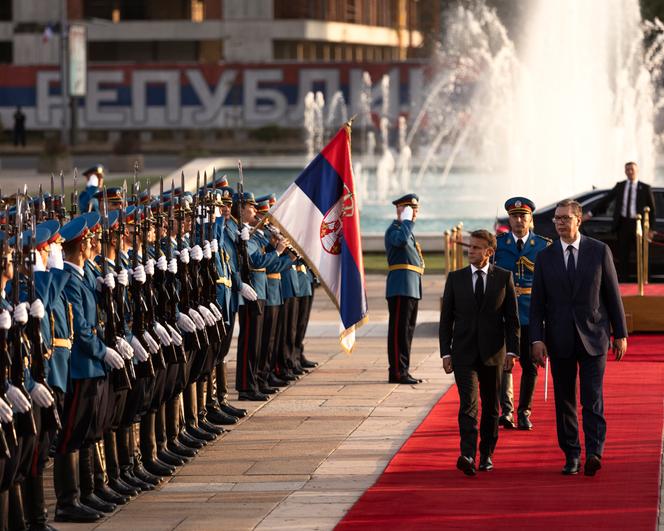
Serbia did things in style, and in the purest diplomatic tradition. President Emmanuel Macron was received on Thursday, August 29 in Belgrade, covered with French flags and to the sound of cannon fire, to sign what he called “a historic agreement” to sell 12 Rafale fighter jets to the Balkan country that has remained close to Moscow.
The French head of state, who had taken a 24-hour break from his consultations in Paris to appoint a prime minister, celebrated the export contract, despite its controversial nature. Macron described Belgrade’s Rafale purchase as a “strategic change” and a “true demonstration of European spirit” by a country that had previously been equipped only with Russian-engineered MiG-29 fighter jets.
“For the first time, we’re going to have aircraft manufactured by the West, and I think that’s a good way to go,” Serbian President Aleksandar Vucic also said, adding that “the Rafale is the best aircraft in the world.” Serbia has pledged €2.7 billion for nine single-seat and three two-seat Rafales, which should be delivered between 2028 and 2029, when its old MiG-29s reach the end of their service life.
Serbia is the eighth country in the world to opt for the Rafale after Egypt, India and the United Arab Emirates, but it is probably the most sensitive customer because of its historical proximity to Moscow, combined with its geographical position, in the heart of Europe, and the persistence of frozen conflicts with several of its neighbors, starting with Kosovo.
‘Profound political change’
Macron took a positive view, saying that the “Rafale club” can “contribute to peace in Europe” and be a “tremendous opportunity for regional integration.” Croatia and Greece are already equipped with the same aircraft. According to Eric Trappier, CEO of Dassault Aviation, who was also part of the trip, the Serbs should get “the most modern model currently in service in the French army.”

However, he refused to specify whether it was the F3-R or the F4.1, while neighboring Croatia acquired secondhand F3-Rs in April and is watching this contract with its historic enemy with concern. While Serbia will be able to equip its Rafales with MICA missiles, France has so far refused to give it access to the Meteor, a more recent missile with a greater range.
The French president also dismissed fears of espionage or technology transfer to Russia. “All guarantees are always taken to preserve our intellectual property and know-how,” he defended. However, neither Trappier nor the Elysée were in a position to detail the technical measures taken specifically to prevent Serbia from leaking technology to Moscow.
You have 57.87% of this article left to read. The rest is for subscribers only.